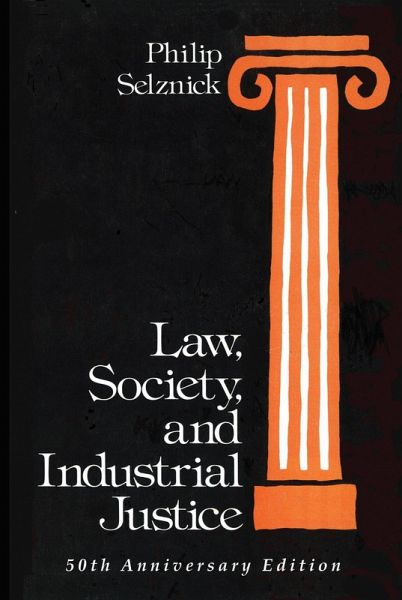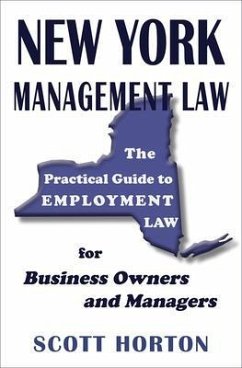
Law, Society, and Industrial Justice (eBook, ePUB)
Versandkostenfrei!
Sofort per Download lieferbar
9,49 €
inkl. MwSt.
Weitere Ausgaben:

PAYBACK Punkte
0 °P sammeln!
LAW, SOCIETY, AND INDUSTRIAL JUSTICE is a foundational study of workplace justice, still engaging and referenced a half-century after its original publication. The 50th Anniversary Edition adds an extensive, substantive Foreword by Berkeley's Lauren Edelman. She writes that the book "remains important for how it conceptualizes law, for how it conceptualizes organizations, and for the theory Selznick offers regarding the moral evolution of organizations as they become 'institutions,' or living entities infused with values." It is "a profound book for many reasons," as she critically examines. N...
LAW, SOCIETY, AND INDUSTRIAL JUSTICE is a foundational study of workplace justice, still engaging and referenced a half-century after its original publication. The 50th Anniversary Edition adds an extensive, substantive Foreword by Berkeley's Lauren Edelman. She writes that the book "remains important for how it conceptualizes law, for how it conceptualizes organizations, and for the theory Selznick offers regarding the moral evolution of organizations as they become 'institutions,' or living entities infused with values." It is "a profound book for many reasons," as she critically examines. Norms and values still matter in organizational governance - even in what amounts to "private government" - as this classic work reminds us. "Selznick's classic text invites the reader to understand the interplay of formal and informal structures that produce new organizational norms, which, at their best, would replace workplace arbitrariness with due process protections like those embodied in the Rule of Law. It is not just an extraordinary contribution to the fields of sociology and jurisprudence, it is the theoretically foundational precursor to entire subfields in sociology and law." - Laura Beth Nielsen, Chair, Department of Sociology, Northwestern University; Research Professor, ABF "Philip Selznick laid the foundation for one of law and society's most vibrant areas of inquiry: law and organizations. Although this book has often been underappreciated, its 50th anniversary is a good opportunity to reassess its significance. Indeed, the current #MeToo movement lends more urgency to Selznick's highly relevant ideas about conceptualizing organizations as legal orders, the importance of changing norms and values, the role of law within organizations, and organizations' influence on the law." - Ashley T. Rubin, Sociology, University of Hawai'i at Manoa "Selznick's study is undoubtedly the most erudite and imaginative example of the natural-law approach to appear. ... It is a very fine, even extraordinary piece of legal scholarship. It displays much craftsmanship, depth of learning, and creativity. It is elegant in style and graceful in presentation. Every legal sociologist should read it." - Donald J. Black, American Journal of Sociology "A contribution, brilliant and substantial, to the literature on private government." - Winston M. Fisk, American Political Science Review
Dieser Download kann aus rechtlichen Gründen nur mit Rechnungsadresse in A, B, CY, CZ, D, DK, EW, E, FIN, F, GR, H, IRL, I, LT, L, LR, M, NL, PL, P, R, S, SLO, SK ausgeliefert werden.










![How To Set Up a Legal Defense Fund for False Imprisonment or Wrongful Workplace Termination [Article] (eBook, ePUB) Cover How To Set Up a Legal Defense Fund for False Imprisonment or Wrongful Workplace Termination [Article] (eBook, ePUB)](https://bilder.buecher.de/produkte/72/72393/72393165n.jpg)


